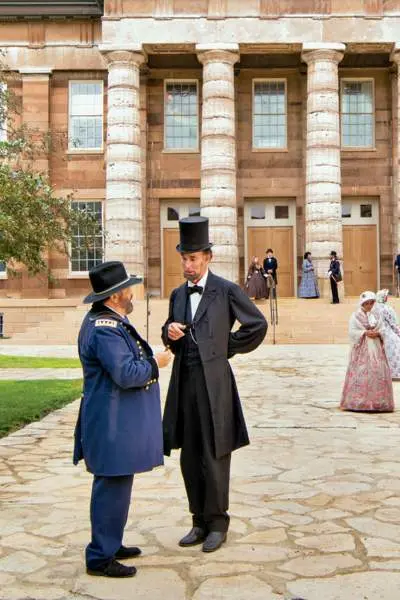
A bonneted woman in 1830s garb weaves textiles on her clickety-clackety loom at Lincoln’s New Salem, a quiet, forested cluster of wood-hewn homes and businesses just south of Petersburg. Historical interpreters dot the town, a re-creation of what stood here when Abraham Lincoln arrived in his early 20s, and they share little-known stories of a young man trying to find his place in the world. He co-owned two shops that left him in debt but earned him the nickname “Honest Abe.” Here, Lincoln mourned his first love and studied judicial law before leaving in the mid-1830s for two new jobs: a lawyer on Illinois’ 8th Circuit and a representative in the state Legislature.
It didn’t take Lincoln long to see how working inside the Vandalia Statehouse State Historic Site could give this up-and-coming attorney a chance to lead. He received his law license in the white-pillared building. Soon after, Lincoln and eight colleagues persuaded the Legislature to move the state capital from Vandalia to Springfield, a bigger city with a booming population.
At about the same time, Lincoln’s father and stepmother moved to a cabin near Lerna, where Lincoln worked on Circuit Court cases. Horse-drawn plows furrow the farmland and Ossabaw hogs use their long snouts to dig for food at the Lincoln Log Cabin State Historic Site, which re-creates 1840s farm life. Costumed interpreters cook noon meals, tend the plantings and talk of Lincoln’s visits. Events celebrate the history of this pastoral place year-round.


Settling down
For Lincoln, when he wasn’t on the Circuit, life in Springfield meant busy days working mostly as a small-claims lawyer, handling disputes over railroad bridges, land and money. The work paid well, and though Lincoln loved it, he still had political ambitions. Marrying Mary Todd in 1842 and welcoming four sons established Lincoln as a family man and helped this self-educated frontier politician learn genteel social graces. Docents at the Lincoln Home National Historic Site, the only home he ever owned, speak of his indulgent parenting and of the family’s day-to-day life.
Within a few years, Lincoln partnered with William Herndon in an office near the Old State Capitol State Historic Site, where Lincoln tried cases, finished out his service as a state rep and impressed colleagues with his astute political ideas. But no one walking those wood floors in 1858 could have imagined the lasting significance of what we know today as Lincoln’s “House Divided” speech, given during his failed bid for the U.S. Senate. Lincoln had spoken out against slavery before, even during his Vandalia days, but this particular speech cemented his stance and predicted the Civil War three years before its start.
Campaigning for the Senate took Lincoln to friends’ homes. A “Lincoln Slept Here” spot awaits at the Vermilion County Museum Complex in Danville. The bedroom, on the second floor of the home owned by former state legislator William Fithian, looks just as it did then, with the original bed, balcony and a newspaper announcing Lincoln’s candidacy. Another friend, David Davis, a judge on the 8th Circuit, became Lincoln’s campaign manager during the 1860 presidential race and Lincoln’s choice for the U.S. Supreme Court in 1862. Though the David Davis Home in Bloomington wasn’t built until 1872, seven years after Lincoln’s death, tours show how luxurious homes like these, and how women like Sarah Davis and Mary Todd Lincoln, gave the untamed frontier culture and class.



Capturing the legacy
What happens next feels like a whirlwind—a presidential election that hurled more insults than today’s races, Lincoln’s arrival in Washington in 1861 and the Civil War’s beginning just three months later. The Abraham Lincoln Presidential Library and Museum in Springfield uses technology to pull visitors into each moment. Loud, snide voices narrate the newspapers’ put-downs. A huge screen shows the progression of battles in the Civil War—and the alarming, running clock-like rate of soldiers’ deaths. A 17-minute, multiple-screen movie ponders Lincoln’s eyes and how difficult it is for an artist to capture all of the worries and emotions locked inside them. Hologram-actors talk straight about documents inside Lincoln’s presidential library. A theater production chronicles the origins and evolution of the Civil War anthem, The Battle Hymn of the Republic.
But stepping into the funeral scene feels like a shock—just as people 150 years ago reeled from Lincoln’s assassination. The technological busy-ness of the museum silences as if someone has flipped a switch. Absolute quiet blankets the darkened room; Lincoln’s casket looks just as it did lying in state at the Old State Capitol.
Some people who’ve had a near-death experience say their life “passed before their eyes”—that snippets of the highlights and lowlights came to them in a vision. Leaders at the Lincoln Heritage Museum at Lincoln College in the town of Lincoln designed this new building with that in mind. If Lincoln’s life passed before his eyes, the exhibits, which begin at the reconstructed door of the Ford’s Theater, chronicle what he might have seen. Reproductions of artifacts encourage touching. Touch a picture frame and the photo dissolves into a video explaining that image and time in Lincoln’s life. Touch the tree near Nancy Lincoln’s portrait and you’ll hear a first-person story about Lincoln’s mother’s death. At the end, a boarding-house room lays bare Lincoln’s final hours, surrounded by doctors and cabinet members, including Secretary of War Edwin Stanton, who uttered the words still quoted today: “Now he belongs to the ages.”
Which, of course, is true. Travelers from all over the world rub the nose on the bronze bust outside the Lincoln Tomb at Oak Ridge Cemetery in Springfield. A 117-foot granite monument stands outside; inside, four kinds of marble cover the floors and walls. Knowledgeable park rangers reveal the stories behind Lincoln’s entombment, as well as Mary’s and their three youngest sons—and a foiled attempt to rob the graves. Bronze plaques throughout the rotunda capture some of the most quotable moments from Lincoln’s speeches, including his goodbye speech to Springfield, the Gettysburg Address and his Second Inaugural, delivered just one month before his death.
Share your Moments
#EnjoyIllinois




